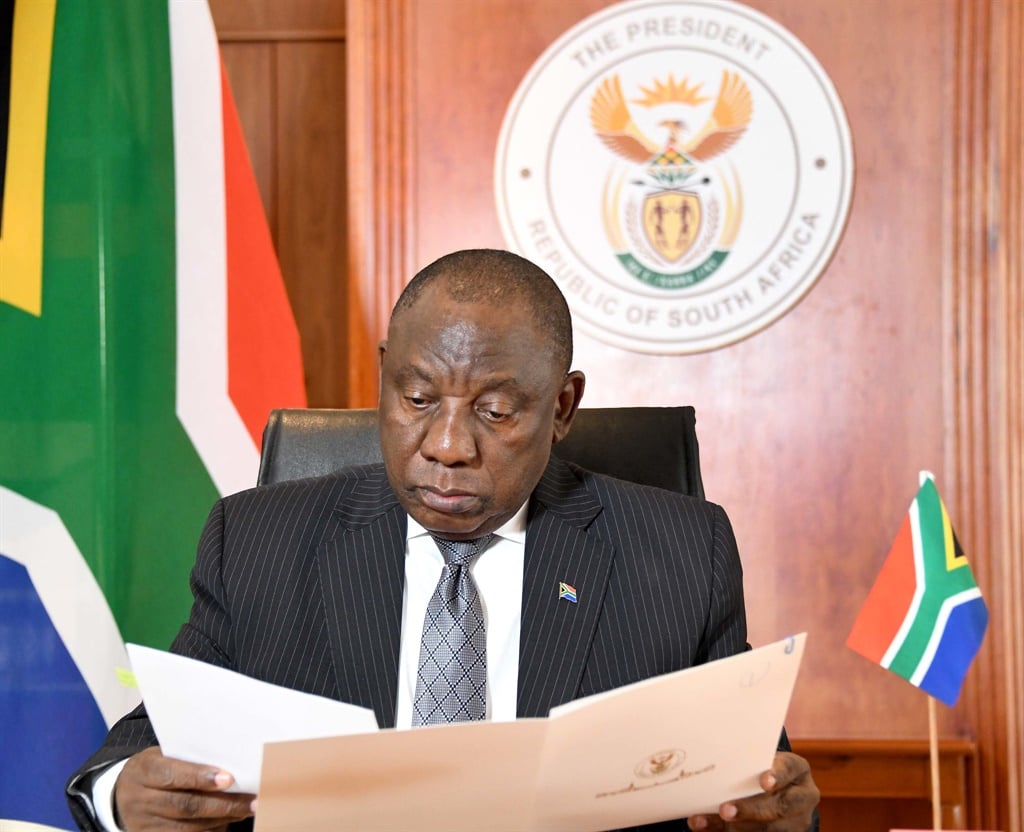


President Cyril Ramaphosa. Picture: GCIS
- The DA welcomed President Cyril Ramaphosa referring the Copyright Amendment Bill and the Performers’ Protection Amendment Bill back to Parliament.
- The EFF criticised Ramaphosa for this move, questioning his motives.
- Ramaphosa sent both bills back to Parliament based on reservations about its constitutionality.
President Cyril Ramaphosa referral of two bills – the Copyright Amendment Bill and the Performers’ Protection Amendment Bill – back to Parliament based on reservations about its constitutionality has been welcomed by one opposition party, and decried by another.
It is the latest of several pieces of legislation Ramaphosa has sent back to Parliament, including the controversial Protection of State Information Bill, which was passed in 2013.
In a statement, the Presidency says the bills “have been referred to the president for assent and signing into law however the president is concerned that the legislation is open to constitutional challenge”.
“The president has, in correspondence to the Speaker of the National Assembly, acknowledged the noble objectives of the amendments but also indicated to the Speaker that the Presidency has received a number of submissions opposing the signing into law of the two bills,” the statement read.
Both bills were passed in March last year.
The DA has been a strident opponent of the Copyright Amendment Bill. Its spokesperson on trade and industry, Dean Macpherson, welcomed the referral back to Parliament, noting that the DA was among those who petitioned Ramaphosa to send it back.
READ | Ramaphosa refers controversial Secrecy Bill back to Parliament, citing constitutional concerns
Macpherson said in a statement that there are several flaws with the Bill, including:
- The introduction of “fair use” which gives individuals the right to use copyrighted work “fairly”, in essence, to circumvent copyright protections and republish them without consent;
- The Bill will undermine our commitment to international treaties such as the Berne Convention and the Agreement on Trade Related Aspects of International Property Rights;
- Local content producers and education contributors will be severely prejudiced due to their works not being protected in South Africa and aboard. This could have devastating consequences for schools and universities; and
- Insufficient public consultation on the final version of the Bill which contains clauses that were changed without input from stakeholders.
“Unfortunately, the ANC in the committee and Parliament dogmatically refused to listen to our concerns and chose to bulldoze the Bill through in the hope it would prop up their election prospects,” he said.
“The referral back to Parliament by President Ramaphosa gives the Portfolio Committee and Parliament a final chance to rectify the serious flaws with the Bill and get it right in order to promote copyright protection as well as protect our preferential trade agreements.”
ALSO READ | Ramaphosa refers Liquor Bill back to Parliament, wants input from traditional leaders
The EFF slammed Ramaphosa for sending the bills back, particularly the Performers’ Protection Amendment Bill, and took issue with the time lapsed between the bills passing in Parliament and Ramaphosa’s referral.
“The Performers’ Protection Amendment Bill is an important piece of legislation that would restore the performers’ rights over their own work back in their hands. This Bill, together with the Copyrights Amendment Bill, was approved by Parliament’s committees in the National Assembly and the NCOP in March last year.
“It has taken this president until yesterday to respond, and his response is to send it back to Parliament. This means the process of signing this important piece of legislation has been prolonged unnecessarily,” reads a statement from EFF spokesperson Vuyani Pambo.
He said while Ramaphosa is within his rights to send the bills back to Parliament, he could have done it much sooner.
“It is clear from his response that the arguments he makes could have been observed by his legal team within less than a month. What seems to be his greatest concern though, is that the Bill could be open to legal challenge. If that is so, all the more reason why he should have responded much earlier so that those concerns can be dispensed of a lot sooner given the importance of the bills.”

